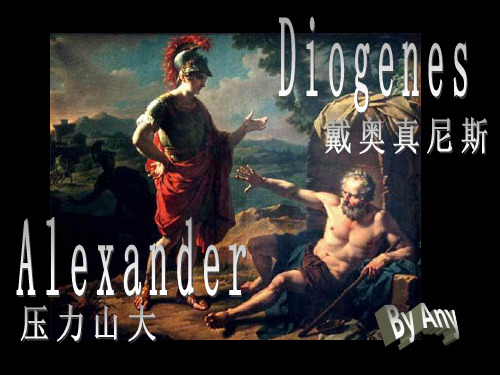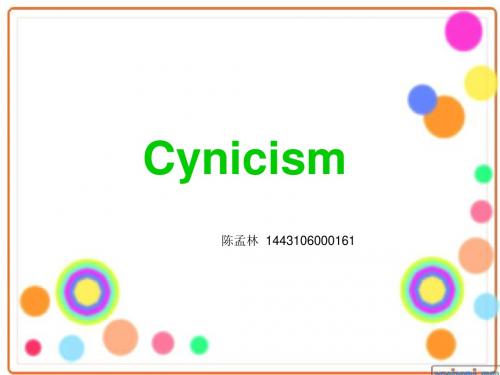犬儒主义(英文版)
- 格式:doc
- 大小:79.50 KB
- 文档页数:5
![[指南]犬儒主义](https://img.taocdn.com/s1/m/61083472e55c3b3567ec102de2bd960590c6d9f1.png)
[指南]犬儒主义CynicismThis article is about the current understanding of the word "cynicism". For information on the ancient Greek school of philosophy, see Cynic. For other uses, see Cynic (disambiguation).Cynicism (Greek: Kυνισμ?ς) originally comprised the various philosophies of a group of ancient Greeks called the Cynics, founded by Antisthenes in about the 4th century BC. The Cynics rejected all conventions, whether of religion, manners, housing, dress, or decency, advocating the pursuit of virtue in a simple and unmaterialistic lifestyle.By the 19th century, emphasis on the negative aspects of Cynic philosophy led to a new and very different understanding of cynicism to mean an attitude of jaded negativity, and a general distrust of the integrity or professed motives of other people. Modern cynicism, as a product of mass society, is a distrust toward professed ethical and social values, especially when there are high expectations concerning society, institutions and authorities which are unfulfilled. Cynicism can manifest itself as a result of frustration, disillusionment, and distrust perceived as due to organizations, authorities and other aspects of society, and thus is roughly equivalent to a substantive form of the English word "jaded".History of cynicismThe classical Greek and Roman Cynics regarded virtue as the only necessity for happiness, and saw virtue as entirely sufficient for attaining happiness. Classical Cynics followed this philosophy to the extent of neglecting everything not furthering their perfection ofvirtue and attainment of happiness, thus, the title Cynics, derived from the Greek word κ?ων, ("dog" inEnglish) because they allegedly neglected society, hygiene, family, money, etc, in a manner reminiscent of dogs. They sought to free themselves from conventions; become self-sufficient; and live only in accordance with nature. They rejected any conventional notions of happiness involving money, power, or fame, to lead entirely virtuous, and thus happy, lives.The ancient Cynics rejected conventional social values, and would criticise the types of behaviours, such as greed, which they viewed as causing suffering. Emphasis on this aspect of their teachings led, in the late 18th and early 19th century,to the modern understanding of cynicism as "an attitude of scornful or jaded negativity, especially a general distrust of the integrity or professed motives of others." This modern definition of cynicism is in marked contrast to the ancient philosophy, which emphasized "virtue and moral freedom in liberation from desire."犬儒主义來源於古希臘犬儒學派學者主張的哲學思潮。

【哲学词典】犬儒(Cynics)
犬儒
[源自希腊词kunikos,它是从kuon(意为“狗)转折而来,意为”类似于狗的“]指的是苏格拉底的弟子安提斯泰尼所创建,以西诺班的第欧根尼为代表的希腊学派。
这个学派的得名是因为它反对当时的文明生活,并且反对任何文化约束(规范),而要求我们与自然(physis)一致,像狗一样生活,即从文明生活的观点看,无休无耻地生活。
他们不仅提倡这种苦行主义的生活方式,而且还实际实行它。
不过,犬儒主义不是道德虚无主义。
他们相信德性对于幸福生活是充足的,在于自由地做理性所要求的事情,对欲望和感情的自我主宰,以及对诸如财富、社会地位、愉快和痛苦等外界纷扰的淡漠。
他们认为,”德性“独立于命运和运气。
一种有德行的生活内在地好于无德的生活。
这个观点所寻求的是把人性从社会和历史的背景中独立出来。
动物行为被看作是自然的标准。
它深刻地影响了希腊化时期的圣者的理想,尤其是斯多亚主义的伦理学。
“自从公元前1世纪中叶以来,一个无所不在的人物就是游走性的犬儒,其主要信条是德性的绝对自足。
所有的社会规范、身体安适和命运的馈赠都是微不足道的。
“——朗格和赛德利:《希腊化时期的哲学家》,I,1987年,第3页。

犬儒主义-详解犬儒主义(Cynicism)目录• 1 什么是犬儒主义• 2 犬儒主义的词源及演变[1]• 3 现代犬儒主义的表现[1]• 4 现代犬儒主义的危害性[1]• 5 现代犬儒主义的典型特征• 6 参考文献什么是犬儒主义犬儒主义是指人们由于对社会总体上或某些具体方面的预期与其实际感受不相匹配,而产生的失望和不满,但对此并不进行积极对抗,甚至会纵容的一种消极态度。
它的一个突出的表现是对一个对象或多个对象的不信任,这种不信任给犬儒主义者的工作、生活和人际交往带来直接或间接的消极影响。
犬儒主义的词源及演变[1]犬儒主义是古希腊的一个哲学流派,这个学派的奠基人叫安提斯泰尼,他主张不要政府、不要私有财产、不要婚姻、不要确定的宗教,但他的这些思想在当时没有产生太大影响。
通常人们公认为安提斯泰尼的弟子——底约基尼斯是犬儒主义学派的创始人底约基尼斯主张清心寡欲。
鄙弃俗世的荣华富贵。
力倡回归自然。
拒绝接受一切的习俗——无论是宗教的、风尚的、服装的、居室的、饮食的、或者礼貌的。
他对“德行”具有一种热烈的感情,他认为和德行比较起来,俗世的财富是无足计较的。
早期的犬儒主义是极其严肃和愤世嫉俗的。
但并不玩世不恭。
如底约基尼斯是一个激烈的社会批评家,他立志要揭穿世间的一切伪善,热烈地追求真正的德行,希望人们从物欲之下真正解放出来。
在公元前三世纪的早期,犬儒学派逐步世俗化.他们认为没有物质财产的生活是最为轻松的生活.但世俗的犬儒主义并不要求人禁绝世俗的好东西,而仅仅是对其表示具有某种程度的漠不关心。
这个时期的犬儒主义者,虽然依然蔑视世俗。
但却失去了蔑视所依据的道德原则。
于是就出现了这样的后果:世间无所谓高尚,也就无所谓下贱。
既然没有什么东西是了不得的,因而也就没有什么东西是要不得的。
他们一方面对世俗观念做出满不在乎的姿态.另一方面又毫无顾忌地去获取他想要获取的任何世俗的东西。
于是愤世嫉俗就变成了玩世不恭,追求真正的德行变成了否认内在的德性与价值。



关于diogenes英文作文英文:Diogenes was a Greek philosopher and one of thefounders of the Cynic philosophy. He was known for his unconventional behavior and his disregard for social norms. One of the most famous stories about Diogenes is when hewas seen carrying a lamp in the daytime, and when askedwhat he was doing, he replied that he was "looking for an honest man."Diogenes believed in living a simple and virtuous life, free from the trappings of wealth and material possessions. He famously lived in a large ceramic jar in the marketplace, and when asked why he did so, he replied, "I am looking for a human being." This shows his disdain for thesuperficiality of society and his desire to live in accordance with nature.I find Diogenes' philosophy to be quite inspiring. Intoday's world, where we are often consumed by the pursuit of wealth and status, his teachings remind us to focus on the things that truly matter. For example, I once found myself caught up in the rat race of corporate life, constantly striving for a bigger paycheck and a higher position. But after learning about Diogenes, I realized that true happiness comes from living a life of virtue and simplicity.中文:底格尼斯是一位希腊哲学家,也是犬儒主义的创始人之一。
C选项呢,cynicism,刚才cynical也考了一个,这是很重要的GRE 词汇,是“犬儒主义”,是吧。
我们习惯上,现在英语里一般把它翻成“愤世嫉俗、玩世不恭”。
这就是古希腊的一个思想流派犬儒主义。
犬就是狗,儒就是知识分子思想的大师,是吧,犬儒就是狗大师的意思。
(笑)这个不要笑,本来就是这样。
创始人叫安提斯提尼,他的徒弟叫狄奥根尼,学哲学的同学都学过,是吧。
狄奥根尼他们这一派认为那一切什么乱七八糟的生活都没意思,提倡回归自然,回归简朴,就好像一个狗一样地生活。
这样导致的结果是自称是一条纯种的狗。
古希腊的人很尊重他,不敢把他叫狗,他很生气说“N~~明明是狗为什么不叫狗?”大家战战兢兢地在后面添了一个“儒”,表示狗大师,是吧,表示对他的尊重。
这概念翻译到中国来的时候,早期的中国知识分子酸溜溜地文绉绉翻译成这么独特的词,何必呢?就翻译成“狗大师”大家都明白。
就是这派犬儒主义者。
这派起初都是些愤世嫉俗的人,后来理想破灭,蜕变成玩世不恭。
我们说愤世嫉俗和玩世不恭,表现形式很相似,是不是表现很相似?骨子里是截然不同的,但表现形式很相似,对世俗的东西都是讽刺和挖苦,都是这样。
尽管这样,骨子里截然不同,愤世嫉俗的人是激烈的纯粹的理想者,玩世不恭的人是彻底的虚无主义者,本质是截然对立的,但表现形式有很多相似的地方。
当然我们处在一个不讲理想斗争的一个平庸年代,是吧,稳定压倒一切的弱智年代里,我们不再讲理想斗争了,很多人对这个激烈的理想主义,蜕变成彻底……理想者的蜕变已经感到陌生了。
其实我们生活中理想主义者到处都有,好比说我们对人生事业的理想啊,就说生活中普通的理想你总有吧,比如说爱情上的理想主义者。
小伙不错,内在外在都很好,大学四年没谈恋爱,为什么?好多女孩子追他都不答应,为什么?因为他是爱情上的理想主义者,坚信有个女孩等了他五百年之类的,就不谈。
看到,呃这个就是那个,是吧,然后就谈起来,谈得挺高兴,一个星期以后发现这个女孩子同时有七个男朋友。
What’s CynicismCynicism, refers to the beliefs of an ancient school of Greek philosophers known as the Cynics.Their philosophy was that the purpose of life was to live a life of Virtue in agreement with Nature. This meant rejecting all conventional desires for wealth, power, health, and fame, and by living a simple life free from all possessions.People could gain happiness by1.rigorous(严苛的) training2.living in a way which was natural for humans.Suffering was caused by1.false judgments of what was valuable2.the worthless customs and conventions which surrounded society.Many of these thoughts were later absorbed into Stoicism(禁欲主义)3 main cynicsAntisthenesAn older contemporary of Plato1. A disciple(门徒,弟子) of Socrates1.He preached a life of povertyDiogenes of Sinope1.The disciple of Antisthenes (?)1.He embraced the ascetic(禁欲的) way of life1.lifestyle:self-sufficiency ,austerity(苦行), and shamelessnessAsceticism:sleeping in a tubShameless behaviour: eating raw meatBiting satire: "bad people obey their lusts as servants obey their masters"Crates of Thebes others1.The third figure who dominates Cynic history.He is said to have been a pupil of Diogenes (?)2 origins of the Cynic1.In ancient times, the first Cynic Antisthenes, taught in the Cynosarges gymnasium(古希腊运动场)at Athens.2.Cynosarges means the place of the white dog3.Dog was thrown at the Cynics as an insult for their rejection of conventional manners.4.Diogenes, states "other dogs bite their enemies, I bite my friends to save them."4 reasons for why the Cynics are so named1 The indifference of their way of life, like dogs, eat and go barefoot in public.2The dog is a shameless animal, and they make a cult(膜拜,崇拜) of shamelessness3The dog is a good guard, and they guard the tenets(宗旨,原则)of their philosophy4The dog is a discriminating animal which can distinguish between its friends and enemiesFundamental principles1The goal of life is happiness which is to live in agreement with Nature2Happiness depends on being self-sufficient, and a master of mental attitude3Self-sufficiency is achieved by living a life of virtue4The road to virtue is to free oneself fromany influence like wealth, fame, or power5Suffering is caused by false judgments of valueCynicism in the Roman WorldThere is little record of Cynicism in the 2nd or 1st centuries BCE(公元前)By the 1st century CE, Cynicism reappeared with full force.The rise of Imperial Rome may have led to a sense of powerlessness and frustration among many people, which allowed a philosophy which emphasized self-sufficiency and inner-happiness to flourish once again.Cynicism and ChristianitySome scholars have argued that the Q document,the hypothetical(假设的) common source for the gospels(福音)of Matthew(马太)and Luke(路可),has strong similarities with the teachings of the Cynics.Other scholars doubt that Jesus was deeply influenced by the Cynics, and see the Jewish prophetic(预言的) tradition as of much greater importance1.Many of the ascetic (苦行的)practices of Cynicism may have been adopted byearly Christians.1.The ascetic orders of Christianity also had direct connection with the Cynics,and in many of their practices were little different from the Cynics of an earlier agecontemporaryBy the 19th century, emphasis on the negative aspects of Cynic philosophy led to the modern understanding of cynicism to mean——An attitude of scornful negativity, especially a general distrust of the sincerity or goodness of human motives and actionsIt can manifest itself as a result of frustration, disillusionment, and distrust perceived as due to organizations, authorities and other aspects of societySocial Effects of CynicismThe cynicism of Diogenes☐artificial growths of society were incompatible with happiness☐morality implies a return to the simplicity of nature☐"Humans have complicated every simple gift of the gods.“☐"cosmopolitan”☐Scorned family; political social organization; property rights; reputation.The ideal Cynic would evangelise:hound people about the error of their ways (watchdog of humanity)expose the pretensions which lay at the root of everyday conventionsPositive effectsTraditional cynicism is a worthy and even noble world-view -- up to a point.●rare opportunity to live in harmony with your values●freedom from self-deception●immunity against faddish "groupthink"●development of an independent, contrarian mind and spirit●introspect the pursuit of fame and fortuneNegative effects•First, cynicism points to the unintended consequences of actions and derides our belief in our ability to rationally assess those consequences or plan for them.•Second, it attacks the stability of institutions•Third, it recasts valued political conceptsEnsemble effect•Different types of cynicism that interact in an "ensemble effect," composed of master-cynic, insiders, and powerless public.•master-cynic•Insiders•powerless publicModern attitude•First,see it critically•Second,make full use of Positive Cynicism: keep our integrity without being miserable•Reject what you can tolerate,Reward yourself by loving something with a passion.1.the fundamental principles of Cynicism● 1.The goal of life is happiness which is to live in agreement with Nature.● 2.Happiness depends on being self-sufficient, and a master of mental attitude.● 3.The road to virtue is to free oneself from any influence such as wealth, fame, or power,which have no value in Nature.2. History of Cynicism1. Origin of the Cynic name---doggishness•from Ancient Greek κυνικός(kynikos), meaning "dog-like•the first Cynic, Antisthenes, taught in the Cynosarges gymnasium at Athens. The word Cynosarges means the place of the white dog。